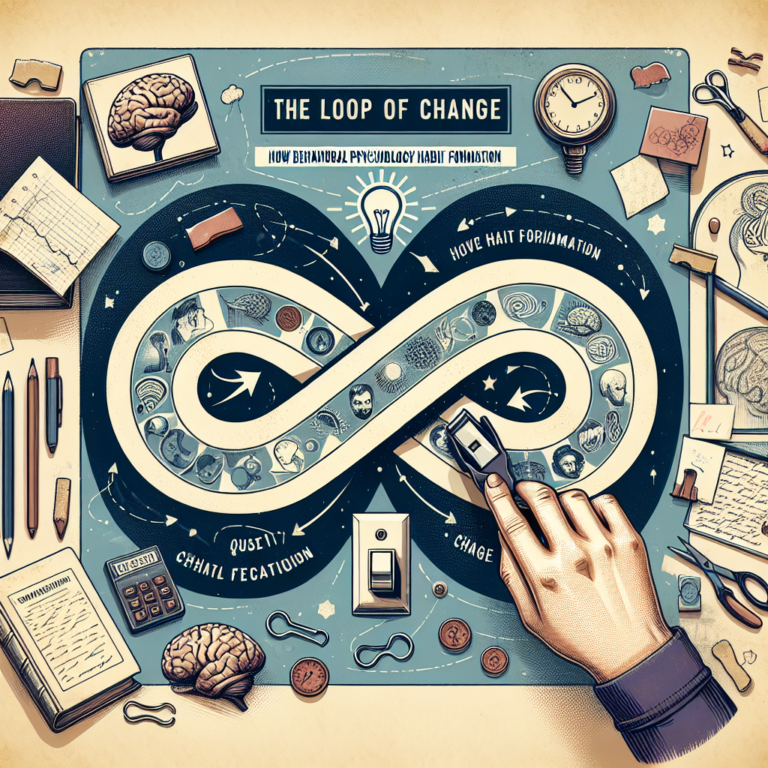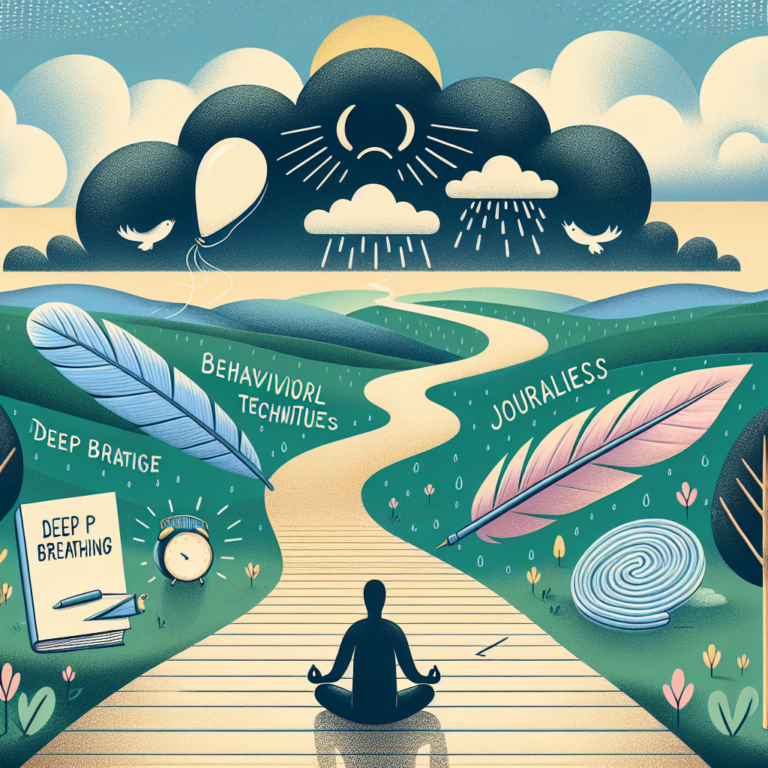
Harnessing Behavioral Psychology: The Secret to Creating Lasting Habits
Creating lasting habits can often feel like an uphill battle. Many of us begin with the fervor of change but struggle to maintain momentum over time. The good news is that by harnessing behavioral psychology, you can uncover the secrets to not only forming habits but making them stick for the long haul. Discover how to turn your aspirations into consistent actions through proven psychological strategies.
Introduction: Why Habits Matter
What differentiates successful individuals from others? The answer often lies in their habits. According to a study published in the European Journal of Social Psychology, it takes an average of 66 days to form a new habit. Yet, many people give up long before that timeline is reached. Why? The psychological hurdles can be daunting. However, by utilizing behavioral psychology principles, the journey to creating lasting habits becomes not just achievable, but also enjoyable.
This article explores harnessing behavioral psychology: the secret to creating lasting habits. By diving deep into actionable strategies backed by research, you will learn how to create, sustain, and reinforce positive habits in your daily life.
The Foundations of Behavioral Psychology
Understanding Behavioral Psychology
Behavioral psychology, also known as behaviorism, emphasizes understanding behavior through observable actions rather than inner thoughts and feelings. Pioneers like B.F. Skinner and John Watson focused on the idea that behaviors are learned through interactions with the environment. This perspective is crucial for habit formation because it highlights the strategies we can adopt to achieve our goals.
The ABC Model of Behavior
One prominent framework within behavioral psychology is the ABC Model, consisting of:
- Antecedents (A): Triggers that initiate the behavior.
- Behavior (B): The action or habit itself.
- Consequences (C): The outcome or reward resulting from the behavior.
By understanding each aspect of this model, you can begin to manipulate the triggers and consequences to make habit-formation easier.
Creating Lasting Habits: Step-by-Step
Step 1: Identifying Triggers
The first step in harnessing behavioral psychology: the secret to creating lasting habits is identifying your triggers.
Case Study: The Habit Loop of Cue, Routine, Reward
In his book "The Power of Habit," Charles Duhigg illustrates how habits operate in a loop—a cue that triggers a routine leading to a reward. For example, a person may feel stressed (cue) and respond by eating a chocolate bar (routine) which provides comfort (reward). Identifying cues will help you understand your current habits and how to replace or modify them.
Step 2: Setting Clear, Achievable Goals
Research shows that setting SMART (Specific, Measurable, Achievable, Relevant, Time-bound) goals is vital. This approach helps in breaking down larger ambitions into manageable tasks.
Table 1: Example of SMART Goal Setting
| Goal Type | Specific Actions | Measurable | Achievable | Relevant | Time-bound |
|---|---|---|---|---|---|
| Exercise | Walk for 30 minutes every day | Track distance | Yes | Aiming for fitness | 4 weeks |
| Eating | Eat one serving of vegetables with each meal | Count servings | Yes | Increase nutrition | 1 month |
Step 3: Building a Support System
Leverage social support. Studies indicate that individuals with supportive networks are more likely to succeed in forming lasting habits. Share your goals with friends or join online communities where you can provide mutual encouragement.
Case Study: Weight Watchers
Weight Watchers emphasizes social engagement and support as crucial in achieving weight-loss goals. Participants share their progress in a supportive environment, making it easier to adopt healthier habits.
Step 4: Implementing Small Changes
Behavior change is typically more successful when initiated through small, incremental steps. This concept, known as behavioral chaining, suggests that starting with little changes makes the transformation feel less daunting.
For instance:
- Instead of vowing to run three miles daily, start with ten minutes of jogging.
- Replace sugary drinks with water one meal at a time.
Step 5: Reinforcement to Maintain Habits
The principle of reinforcement is a cornerstone in behavioral psychology. Positive reinforcement increases the likelihood of repeating a behavior.
Case Study: Gamification in Productivity Apps
Apps like “Habitica” use gamification to reinforce productive habits. Users earn rewards (like points or levels) for completing tasks, encouraging them to stick with their new habits.
Overcoming Challenges in Habit Formation
Acknowledge the Setbacks
Understand that setbacks are a natural part of the habit formation process. Instead of viewing them as failures, see them as learning opportunities. Analyzing what led to a setback can provide invaluable insights for future success.
Motivation vs. Discipline
While motivation can ignite the start of a new habit, discipline carries you through. Behavioral psychologists emphasize that relying solely on motivation can be misleading. Create scheduled routines where your new habits are non-negotiable.
Table 2: Motivation vs. Discipline
| Factor | Motivation | Discipline |
|---|---|---|
| Source | Internal feelings | External schedules and routines |
| Duration | Fleeting and fluctuating | Consistent and reliable |
| Outcome | May lead to sporadic actions | Yields steady, sustained change |
Inspiring Change: The Power of Visualization
Visualization techniques can enhance your ability to create lasting habits. By picturing yourself successfully engaging in your desired behavior, you increase your potential for actualizing it.
Mental Rehearsal Strategies
- Imagine your day broken down into segments where you successfully execute your new habits.
- Picture the rewards of your habits—health, happiness, fulfillment.
Conclusion: The Path Ahead
By harnessing behavioral psychology: the secret to creating lasting habits, you equip yourself with tools that not only facilitate personal growth but also enhance your quality of life. The journey to new habits is not merely about consistent repetition; it’s about understanding and manipulating psychological triggers.
Your future is not set in stone. It’s a canvas waiting for your brushstrokes of habit and intention. Embrace these strategies and watch as your aspirations transform into lasting habits that drive you toward your goals.
Frequently Asked Questions
Q1: How long does it take to develop a new habit?
A: On average, it takes about 66 days to form a new habit, but this can vary based on the complexity of the behavior and individual differences.
Q2: What should I do if I miss a day in my habit-building journey?
A: Don’t consider it a failure! Acknowledge the slip, identify what led to it, and recommit to your goals.
Q3: How can I stay motivated when forming a new habit?
A: Make your goals visible, track your progress, and leverage social support for accountability.
Q4: Are there any tools that can help in habit formation?
A: Yes! Consider using habit-tracking apps, journals, or gamification strategies to keep you engaged and motivated.
Q5: Is it possible to change bad habits?
A: Absolutely! By using the strategies from behavioral psychology, you can identify triggers and reinforce positive behaviors to replace negative ones.
Harnessing behavioral psychology is transformative. As you apply these insights, not only will you develop lasting habits, but you’ll also cultivate resilience and self-awareness. Start today—your journey awaits!














